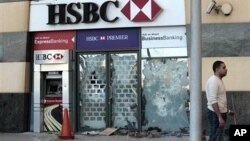With an inflation rate near 13 percent and about 20 percent of Egypt's population living at or below the poverty level, finding even the most basic necessities has become a daily struggle for many Egyptians. It is a situation many analysts say is bound to get worse the longer the protests continue.
"We've been standing in line for five hours just to get some bread; people are fighting over it. They are not happy with Mubarak. Look what they have gotten us into," said one man/
Although some blame the protests for the food shortages, even more blame President Hosni Mubarak's policies for the decline of Egypt's middle class.
Elliott Abrams, a foreign policy analyst at the Council on Foreign Relations, says the crisis has been years in the making. "People are asking for two things fundamentally. They're asking for freedom and they are asking for bread. Egypt has had a lot of economic growth, a lot of stock market rise, a lot of foreign direct investment. But, it is not trickling down. The rich are getting a lot richer; the poor are not getting richer," he said.
Despite economic reforms that have doubled Egypt's Gross Domestic Product since 2004, nearly 40 percent of Egypt's population gets by on less than $2 a day.
"It used to be that college graduates, they get a sort of basic salary from the government and then they go out and get a second job to make ends meet. Today, people who are graduating in the past three years have a terrible problem getting enough money for housing, for a decent living. This economic discontent is behind the political discontent that is now rocking Egypt," said David Ottaway, the Washington Post's former Cairo Bureau Chief.
The unrest also threatens one of Egypt's most important sources of income - tourism, which supports one in every eight jobs. Thousands of tourists have cancelled visits and airlines say the busiest flights are outbound - as many more try to flee the country.
But at one Cairo's busiest bazaars, Canadian tourist Gary Lion says for now, at least, the protests seem a world away. "Of course we are not really used to what it should look like. This is still reasonably busy but we found the people here very warm and friendly, helpful and we really haven't encountered any problems," he said.
Outside the tourist bubble, Egypt's stock market and banks remained closed on Monday. Analysts say the government's shutdown of the Internet continues to disrupt commerce - hurting thousands of companies that use the Internet to buy and sell goods.
Despite the tumultuous events that have rocked the country, Egypt's Suez Canal, a key passage for nearly 10 percent of the world's oil and other commodities, remains open.
But some are starting to question whether the canal will continue to remain isolated from the unrest.
Egypt's Unrest Hurts Economy




